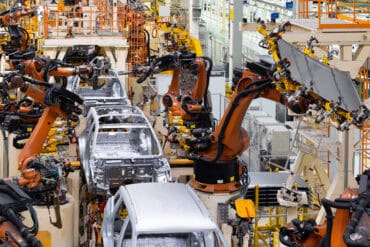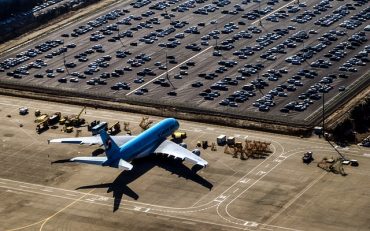
A look at the top 2025 smart auto manufacturing issues related to automation, digital transformation, robotics, embedded AI, and more.
In 2025, auto manufacturers will face a host of complex challenges as they drive their organizations toward smarter, more automated production environments. Digital transformation, robotics, and AI integration are expected to drive changes in the new year and help reshape traditional manufacturing workflows.
Ideally, these developments will usher in a new era of efficiency and innovation. However, with these advancements come substantial obstacles that auto manufacturers must address to stay competitive. Here are the top issues likely to shape smart manufacturing in the auto industry in 2025.
1. Integrating Advanced Automation and Robotics
The automotive industry has long relied on automation, with robots performing everything from welding to assembly. However, the rise of next-generation robotics is introducing more sophisticated, adaptable machines that can collaborate with human operators, execute precision tasks, and even make on-the-spot adjustments using AI. While promising, the integration of these advanced robotics into existing manufacturing workflows will be challenging.
Why? Auto manufacturers often have a mix of legacy and modern machinery on their factory floors. Ensuring that these systems communicate effectively and work in tandem without causing operational bottlenecks will require investment in flexible, scalable integration platforms. Additionally, manufacturers will need to implement strategies that promote harmony between human workers and machines, providing retraining programs to equip workers with the skills necessary to work alongside new robotic technologies.
2. Achieving Data Interoperability and Connectivity
As digital transformation continues, data is becoming one of the most valuable assets for auto manufacturers. Production lines are outfitted with a plethora of sensors and IoT devices, generating vast amounts of data that, if properly harnessed, can offer actionable insights into everything from equipment performance to uptime to product quality. However, one of the biggest obstacles the industry faces is ensuring that this data flows seamlessly across systems.
Data interoperability is key, allowing different technologies to communicate and share information effectively. This often requires a unified data architecture and a commitment to dismantling data silos that prevent cross-functional visibility. Automakers that embrace smart manufacturing should prioritize investment in robust data integration platforms that can centralize data and facilitate a real-time, 360-degree view of manufacturing operations.
See also: The Rise of Robotics: How AI is Reshaping Robotics in Manufacturing
3. Strengthening Cybersecurity in Connected Manufacturing Environments
With more connected devices, automated systems, and AI-driven processes, auto manufacturing facilities are increasingly vulnerable to cyber threats. As more manufacturers connect their operations to the cloud and use IoT devices, auto manufacturers must develop strong cybersecurity frameworks to protect both their data and their assets. Simply put, ensuring a secure manufacturing environment is no longer optional—it’s essential for maintaining trust with clients, suppliers, and shareholders.
4. Leveraging AI and Predictive Analytics for Real-Time Decision-Making
AI-driven analytics is reshaping manufacturing, offering insights that can optimize production lines, predict maintenance needs, and manage supply chain logistics. However, deploying AI tools effectively and interpreting their insights accurately are significant challenges.
Automakers need to ensure that manufacturing facilities are equipped with sufficient computational resources to handle real-time data processing. Hiring skilled data scientists and engineers is crucial to maximize the value of these AI-driven tools. It’s equally important to balance the insights AI provides with human oversight to prevent over-reliance on automation and ensure informed decision-making. As AI becomes a core part of operations, the ability to interpret and act on analytics insights in real time will be a key differentiator for auto manufacturers.
5. Addressing the Workforce Skills Gap
The shift toward automation, robotics, and AI is reshaping the traditional manufacturing workforce. Many current employees lack the skills required to operate and maintain advanced manufacturing systems, creating a significant skills gap in the industry. Auto manufacturers will need to address this shortage by implementing training and upskilling programs that prepare workers for the demands of smart manufacturing.
For manufacturers, fostering a culture of continuous learning and career development is critical to retaining talent and building a future-ready workforce that can drive the next generation of manufacturing innovation.
6. Building Resilient and Adaptive Supply Chains
The disruptions of recent years have highlighted the fragility of global supply chains, forcing auto manufacturers to rethink their approach to procurement and logistics. In 2025, resilience and adaptability will be critical priorities for industry leaders. A key component of this shift is the adoption of smarter, AI-powered supply chain models that can dynamically respond to fluctuations in demand, geopolitical challenges, and raw material shortages.
Additionally, digital twins and predictive analytics can help provide better demand forecasting, allowing manufacturers to proactively manage inventory and production schedules. Blockchain technology can further enhance supply chain visibility and traceability, ensuring compliance with evolving regulatory standards and boosting consumer trust.
7. Meeting Sustainability and Regulatory Standards
With increasingly strict environmental regulations and a growing emphasis on sustainability, auto manufacturers face mounting pressure to reduce their carbon footprint and adopt greener practices. This includes everything from reducing emissions and energy use on the production floor to responsibly sourcing materials. In addition, consumers and investors are becoming more vocal about their expectations for sustainable practices.
Sustainability initiatives should focus on both energy-efficient technologies and the circular economy—minimizing waste, reusing materials, and recycling wherever possible. By embedding sustainability into their operations, manufacturers can not only meet regulatory requirements but also enhance their brand reputation and attract a new generation of eco-conscious consumers.
The Road Ahead
While advancements in automation, AI, and digital connectivity offer transformative opportunities, they also present significant challenges for the industry. Navigating these issues will require a strategic, forward-thinking approach that balances technological innovation with robust cybersecurity, workforce development, and sustainable practices.
In 2025 and beyond, the auto manufacturers that can successfully merge cutting-edge technology with sound business practices will be those that remain at the forefront of the field.










